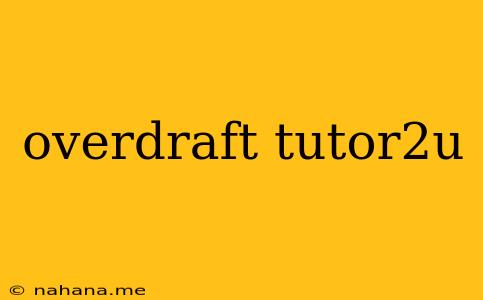Overdraft: A Comprehensive Guide
An overdraft is a short-term loan provided by a bank or other financial institution that allows you to spend more money than you have in your account. It can be a useful tool for managing unexpected expenses or covering short-term cash flow gaps, but it's important to understand the associated costs and risks before using it.
How Overdrafts Work
When you have an overdraft facility, your bank will allow you to spend beyond your account balance, up to a pre-determined limit. For example, if your account has a £100 balance and you spend £150, your bank will cover the remaining £50, creating an overdraft.
Types of Overdrafts
There are two main types of overdrafts:
- Arranged overdraft: This is a pre-approved overdraft facility with a specific limit and interest rate.
- Unarranged overdraft: This is an overdraft used when you spend more than your account balance without a pre-approved facility. These typically come with higher interest rates and charges.
Advantages of Overdrafts
- Flexibility: Overdrafts provide flexibility in managing your finances by allowing you to cover unexpected expenses.
- Emergency funds: Overdrafts can act as emergency funds for unexpected situations, such as car repairs or medical bills.
- Building credit: Using and managing an overdraft responsibly can help build your credit score.
Disadvantages of Overdrafts
- High interest rates: Overdrafts often have high interest rates, which can significantly increase the cost of borrowing.
- Fees and charges: Banks may charge fees for using an overdraft, including daily charges or arrangement fees.
- Debt trap: Overdrafts can easily lead to a debt trap if not managed carefully.
Managing Overdrafts
- Use it sparingly: Overdrafts are meant for short-term needs, not long-term borrowing.
- Track your spending: Keep close track of your spending and balance to avoid exceeding your overdraft limit.
- Pay it off promptly: Make every effort to repay your overdraft as soon as possible to minimize interest costs.
Alternatives to Overdrafts
Before resorting to an overdraft, consider other options:
- Personal loan: Personal loans offer fixed interest rates and repayment periods, which can provide more predictable costs.
- Credit card: Credit cards can offer lower interest rates than overdrafts, especially if you use them responsibly.
Conclusion
Overdrafts can be a useful tool for managing short-term financial needs, but they come with significant costs and risks. Carefully consider the advantages and disadvantages before using an overdraft facility and always prioritize responsible borrowing and repayment practices.
